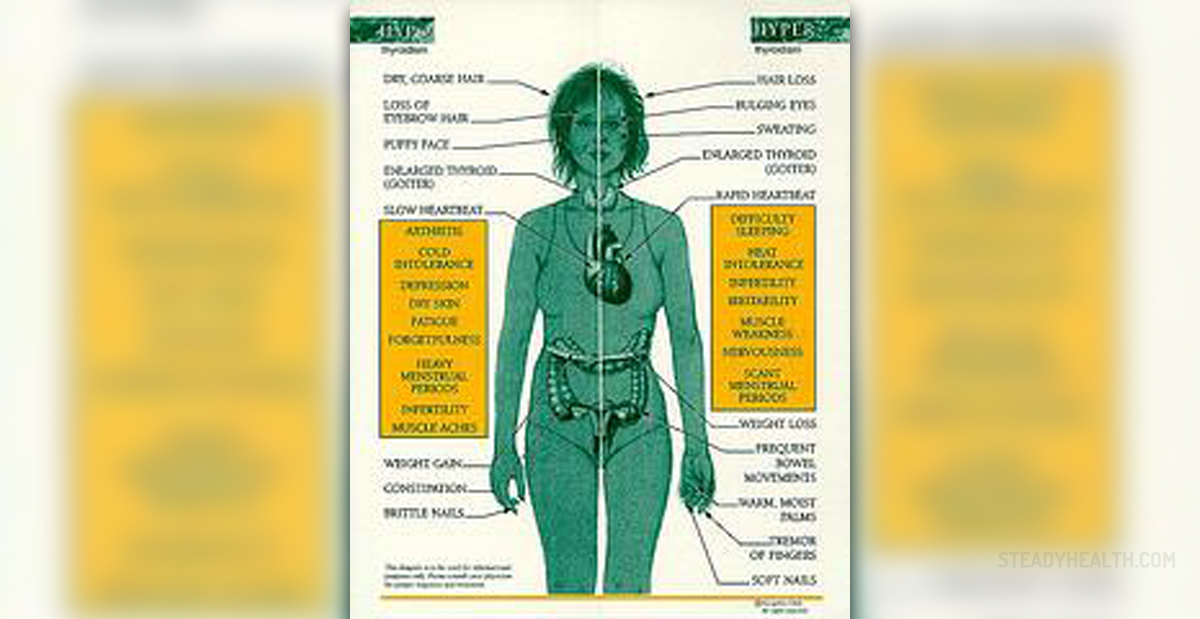
Grave's disease is a medical condition characterized by abnormally excessive production of the thyroid gland. This is an autoimmune disease that leads to overactivity of the gland. Specific autoantibodies activate certain receptors in the thyroid gland and stimulate production of the thyroid hormones. Excess of hormones is detrimental for the entire body especially the heart and the eyes.
The condition is most commonly diagnosed in early adolescence. It is far more present among women. The severity of Grave's disease varies. The condition may sometimes be serious and trigger hyperthyroidism of detrimental proportions.
There is no cure for Grave's disease. However, there are several treatments available. All of them reduce the production of thyroid hormones, bring the level of hormones under control and prevent further damage to the entire body.
Symptoms and Signs of Grave's Disease
The effects of Grave's disease and all the symptoms and signs are connected with direct effects of thyroid hormones which are produced in large amounts or indirect effects of autoantibodies to certain tissues and organs.
As for excess of thyroid hormones, patients typically complain about insomnia, hand tremor, hyperactivity and excessive sweating. They cannot tolerate heat. There is noticeable weight loss in spite of even greater intake of food due to increased appetite. Diarrhea may also occur along with frequent defecation. The skin of such patients is warm and moist and muscles relatively weak. High level of thyroid hormones in the blood is additionally blamed for irregular heart beat (e.g. sinus tachycardia, atrial fibrillation and premature ventricular contractions), palpitations and hypertension. The gland may be enlarged and is basically nontender. Finally, the excess of hormones my trigger a variety of personality changes some of which are psychosis, agitation and depression. Anxiety, restlessness, emotional lability and irritability may occur as well.
Autoantibodies these patients produce attack certain tissues and organ. For instance, they are blamed for Grave's ophthalmopathy, goiter and pretibial edema.
Therapy with Radioiodine is the Most Common Treatment
It is not possible to stop the body prom producing autoantibodies but there are many treatments that may control the production of thyroid hormones and prevent potential complications from developing. Even if a patient ends with certain health issues such as Grave's ophthalmopathy or goiter, there are ways to deal with these issues.
Doctors may choose among antithyroid drugs, partial or complete destruction of the thyroid gland by radioactive iodine or partial/complete surgical removal of the gland. It is best if the benefits and risks of each of the mentioned treatment modalities are taken into consideration prior to making the final decision.
In the United States patients predominantly undergo treatment with radioactive iodine while patients in Europe, Japan and the rest of the world are treated more with antithyroid drugs or undergo surgery. If one treatment modality fails to provide with desirable results, patients undergo other approach.
Radioiodine is a treatment option that is generally engaged if medical therapy or surgery fail to bring the condition under control or when patients need to undergo surgery but there are certain contraindications. Since the thyroid gland absorbs nearly all iodine from the blood, it is obvious that it will also absorb radioactive iodine (I-131). Once taken from the blood by the gland radioactive iodine destroys the gland and this subsequently leads to lesser production of hormones. Unfortunately, sometimes damage to the gland may be extensive and patients develop hypothyroidism. Still, with hormone replacement therapy the level of thyroid hormones is maintained within optimal range.
Furthermore, patients may be prescribed antithyroid drugs such as carbimazole, methimazole and propylthiouracil (PTU). These medications prevent iodine from binding the receptors, therefore these is no excess of iodine and abnormal production of thyroid hormones. This treatment lasts between 6 months and two years and it requires close monitoring of certain blood parameters because it may cause serious side effects such as aplastic anemia.
Finally, patients who do not respond well to either of the previously mentioned treatments undergo surgery. Surgeons choose between partial or total thyroidectomy. Total thyroidectomy is always accompanied by hypothyroidism and a need for hormone replacement therapy. Surgery has several risks. The first one is associated with damage or accidental removal of the parathyroid glands, the ones that control the level of calcium in the blood. Also, there is a risk of transient vocal cord paralysis. Some patients may develop recurrent hyperthyroidism in spite of surgical resection of the gland.Coping with Grave's Disease
Grave's disease can be sometimes hard to deal with. It may trigger various mood swings, interfere with thinking and initiate unbearable mental symptoms. Patients may sometimes appear as if they were suffering from an actual mental disorder. This is why emotional support systems play significant role in the course of the disease and throughout patients' lives.
Apart from being educated by their doctors, patients suffering from Grave's disease may obtain plenty of information regarding their illness via educational materials or resources such as website links, handouts and they also benefit from community support groups.
All in all, with adequate approach from their physicians, support of their families and friends, patients with Grave's disease may overcome many obstacles associated with their disease and live normal lives.

















Your thoughts on this
Loading...